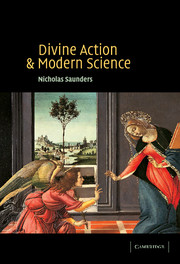Book contents
- Frontmatter
- Contents
- Preface
- Chapter 1 Motivations
- Chapter 2 Theological approaches to divine action
- Chapter 3 The laws of nature and miracles
- Chapter 4 Determinism and SDA
- Chapter 5 Divine action and quantum theory
- Chapter 6 Does God cheat at dice?
- Chapter 7 Chaos Theory and divine action
- Chapter 8 Whole–part models of SDA
- Chapter 9 Is SDA really tenable?
- References
- Index
Chapter 1 - Motivations
Published online by Cambridge University Press: 02 December 2009
- Frontmatter
- Contents
- Preface
- Chapter 1 Motivations
- Chapter 2 Theological approaches to divine action
- Chapter 3 The laws of nature and miracles
- Chapter 4 Determinism and SDA
- Chapter 5 Divine action and quantum theory
- Chapter 6 Does God cheat at dice?
- Chapter 7 Chaos Theory and divine action
- Chapter 8 Whole–part models of SDA
- Chapter 9 Is SDA really tenable?
- References
- Index
Summary
On the day of his consecration the Patriarch Elect of the Coptic Orthodox Church of Egypt is traditionally led to the cathedral, having spent the previous night in chains keeping vigil by the dead body of his predecessor (Butler 1884, vol. 2, 309). When he arrives at the cathedral he is taken to the altar and stands between two bishops as his deed of election is read aloud to the congregation:
we besought the Spotless Trinity with a pure heart and an upright faith to reveal unto us him who (was) worthy of this meditation … Therefore, by an election from above and by the working of the Holy Spirit and by the assent and conviction of us all, it was revealed unto us to have regard unto N for the Apostolic Throne of the divinely-prophetic Mark.
(Khs-Burmester 1960, 58).What is particularly interesting is the procedure adopted by the Copts to most reliably manifest God's choice and revelation of their new Pope - the election from above and working of the Holy Spirit is invoked by means of a very ancient tradition. In the election of their sixty-fifth Pope, HH Shenute II (1032–1046), the Copts adopted a process analogous to the Nestorian custom of choosing their patriarch by means of picking lots. Throughout the next nine hundred years this process was only used occasionally until it became accepted as the standard method of selection in the twentieth century with the election of the current patriarch, HH Shenouda III, on 31st October 1971 (Atiyah 1991, 1999).
- Type
- Chapter
- Information
- Divine Action and Modern Science , pp. 1 - 16Publisher: Cambridge University PressPrint publication year: 2002



